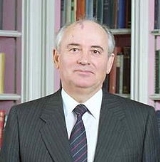
in 1991. He was the only general secretary in the history of the Soviet Union
to have been born during the Communist rule.
Gorbachev was born in Stavropol Krai
into a peasant Ukrainian
-Russian
family, and in his teens operated combine harvester
s on collective farms. He graduated from Moscow State University
in 1955 with a degree in law.
1985 Mikhail Gorbachev becomes the Soviet Union's leader.
1985 Soviet leader Mikhail Gorbachev declares a moratorium on the deployment of middle-range missiles in Europe.
1985 Cold War: In Geneva, U.S. President Ronald Reagan and Soviet Union leader Mikhail Gorbachev meet for the first time.
1986 Cold War: U.S. President Ronald Reagan and Soviet leader Mikhail Gorbachev meet in Reykjavík, Iceland, in an effort to continue discussions about scaling back their intermediate missile arsenals in Europe.
1986 Mikhail Gorbachev, leader of the Soviet Union, releases Andrei Sakharov and his wife from internal exile in Gorky.
1987 Cold War: At the Brandenburg Gate U.S. President Ronald Reagan publicly challenges Mikhail Gorbachev to tear down the Berlin Wall.
1988 U.S. President Ronald Reagan begins his first visit to the Soviet Union when he arrives in Moscow for a superpower summit with Soviet leader Mikhail Gorbachev.
1989 Soviet leader Mikhail Gorbachev arrives in Havana, Cuba to meet with Fidel Castro in an attempt to mend strained relations.
1989 Cold War: In a meeting off the coast of Malta, US President George H. W. Bush and Soviet leader Mikhail Gorbachev release statements indicating that the cold war between their nations may be coming to an end.
1990 Mikhail Gorbachev is elected as the first executive president of the Soviet Union.
Certain people in the United States are driving nails into this structure of our relationship, then cutting off the heads. So the Soviets must use their teeth to pull them out.![]()
Democracy is the wholesome and pure air without which a socialist public organization cannot live a full-blooded life.![]()
If the Russian word "Perestroika|perestroika" has easily entered the international lexicon, this is due to more than just interest in what is going on in the Soviet Union. Now the whole world needs restructuring, i.e. progressive development, a fundamental change.![]()
The Soviet people want full-blooded and unconditional democracy.![]()
Dangers await only those who do not react to life.![]()
I believe, as Vladimir Lenin|Lenin said, that this revolutionary chaos may yet crystallize into new forms of life.![]()

